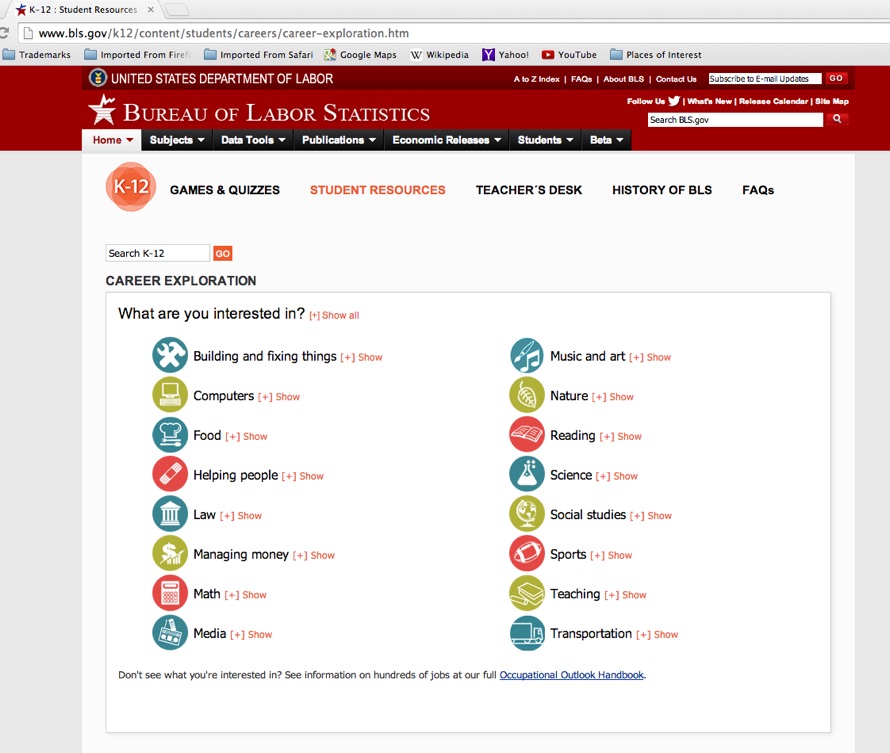Agricultural and Food Science Technicians
Agricultural and food science technicians assist agricultural and food scientists by performing duties such as measuring and analyzing the quality of food and agricultural products.
Associate’s degree
$34,070
Agricultural and Food Scientists
Agricultural and food scientists work to ensure that agricultural establishments are productive and food is safe.
$58,610
Anthropologists and Archeologists
Anthropologists and archeologists study the origin, development, and behavior of humans. They examine the cultures, languages, archeological remains, and physical characteristics of people in various parts of the world.
Master’s degree
$57,420
Atmospheric Scientists, Including Meteorologists
Atmospheric scientists study the weather and climate, and how it affects human activity and the earth in general.
Bachelor’s degree
$89,260
Biochemists and biophysicists study the chemical and physical principles of living things and of biological processes, such as cell development, growth, and heredity.
Doctoral or professional degree
$81,480
Biological technicians help biological and medical scientists conduct laboratory tests and experiments.
Bachelor’s degree
$39,750
Chemical technicians use special instruments and techniques to help chemists and chemical engineers research, develop, and produce chemical products and processes.
Associate’s degree
$42,920
Chemists and Materials Scientists
Chemists and materials scientists study substances at the atomic and molecular levels and the ways in which substances react with each other. They use their knowledge to develop new and improved products and to test the quality of manufactured goods.
Bachelor’s degree
$73,060
Conservation Scientists and Foresters
Conservation scientists and foresters manage overall land quality of forests, parks, rangelands, and other natural resources.
Bachelor’s degree
$59,060
Economists study the production and distribution of resources, goods, and services by collecting and analyzing data, researching trends, and evaluating economic issues.
Master’s degree
$91,860
Environmental Science and Protection Technicians
Environmental science and protection technicians do laboratory and field tests to monitor the environment and investigate sources of pollution, including those affecting public health. Many work under the supervision of environmental scientists and specialists, who direct the technicians’ work and evaluate their results.
Associate’s degree
$41,240
Environmental Scientists and Specialists
Environmental scientists and specialists use their knowledge of the natural sciences to protect the environment and human health. They may clean up polluted areas, advise policy makers, or work with industry to reduce waste.
Bachelor’s degree
$63,570
Epidemiologists are public health professionals who investigate patterns and causes of disease and injury in humans. They seek to reduce the risk and occurrence of negative health outcomes through research, community education, and health policy.
Master’s degree
$65,270
Forensic science technicians help investigate crimes by collecting and analyzing physical evidence. Many technicians specialize in either crime scene investigation or laboratory analysis. Most forensic science technicians spend some time writing reports.
Bachelor’s degree
$52,840
Forest and Conservation Technicians
Forest and conservation technicians measure and improve the quality of forests, rangeland, and other natural areas.
Associate’s degree
$33,920
Geographers study the earth and its land, features, and inhabitants. They also examine phenomena such as political or cultural structures as they relate to geography. They study the physical and human geographic characteristics of a region, ranging in scale from local to global.
Bachelor’s degree
$74,760
Geological and Petroleum Technicians
Geological and petroleum technicians provide support to scientists and engineers in exploring and extracting natural resources, such as minerals, oil, and natural gas.
Associate’s degree
$52,700
Geoscientists study the physical aspects of the Earth, such as its composition, structure, and processes, to learn about its past, present, and future.
Bachelor’s degree
$90,890
Historians research, analyze, interpret, and present the past by studying a variety of historical documents and sources.
Master’s degree
$52,480
Hydrologists study how water moves across and through the Earth’s crust. They can use their expertise to solve problems in the areas of water quality or availability.
Master’s degree
$75,530
Medical scientists conduct research aimed at improving overall human health. They often use clinical trials and other investigative methods to reach their findings.
Doctoral or professional degree
$76,980
Microbiologists study microorganisms such as bacteria, viruses, algae, fungi, and some types of parasites. They try to understand how these organisms live, grow, and interact with their environments.
Bachelor’s degree
$66,260
Nuclear technicians assist physicists, engineers, and other professionals in nuclear research and nuclear production. They operate special equipment used in these activities and monitor the levels of radiation that are produced.
Associate’s degree
$69,060
Physicists and astronomers study the ways in which various forms of matter and energy interact. Theoretical physicists and astronomers may study the nature of time or the origin of the universe. Physicists and astronomers in applied fields may develop new military technologies or new sources of energy, or monitor space debris that could endanger satellites.
Doctoral or professional degree
$106,360
Political scientists study the origin, development, and operation of political systems. They research political ideas and analyze governments, policies, political trends, and related issues.
Master’s degree
$102,000
Psychologists study cognitive, emotional, and social processes and human behavior by observing, interpreting, and recording how people relate to one another and their environments.
$69,280
Sociologists study society and social behavior by examining the groups, cultures, organizations, social institutions, and processes that people develop.
Master’s degree
$74,960
Survey researchers design surveys and analyze data. Surveys are used to collect factual data, such as employment and salary information, or to ask questions in order to understand people’s opinions, preferences, beliefs, or desires.
Master’s degree
$45,050
Urban and regional planners develop plans and programs for the use of land. Their plans help create communities, accommodate population growth, and revitalize physical facilities in towns, cities, counties, and metropolitan areas.
Master’s degree
$65,230
Zoologists and Wildlife Biologists
Zoologists and wildlife biologists study animals and other wildlife and how they interact with their ecosystems. They study the physical characteristics of animals, animal behaviors, and the impacts humans have on wildlife and natural habitats.
Bachelor’s degree
$57,710



